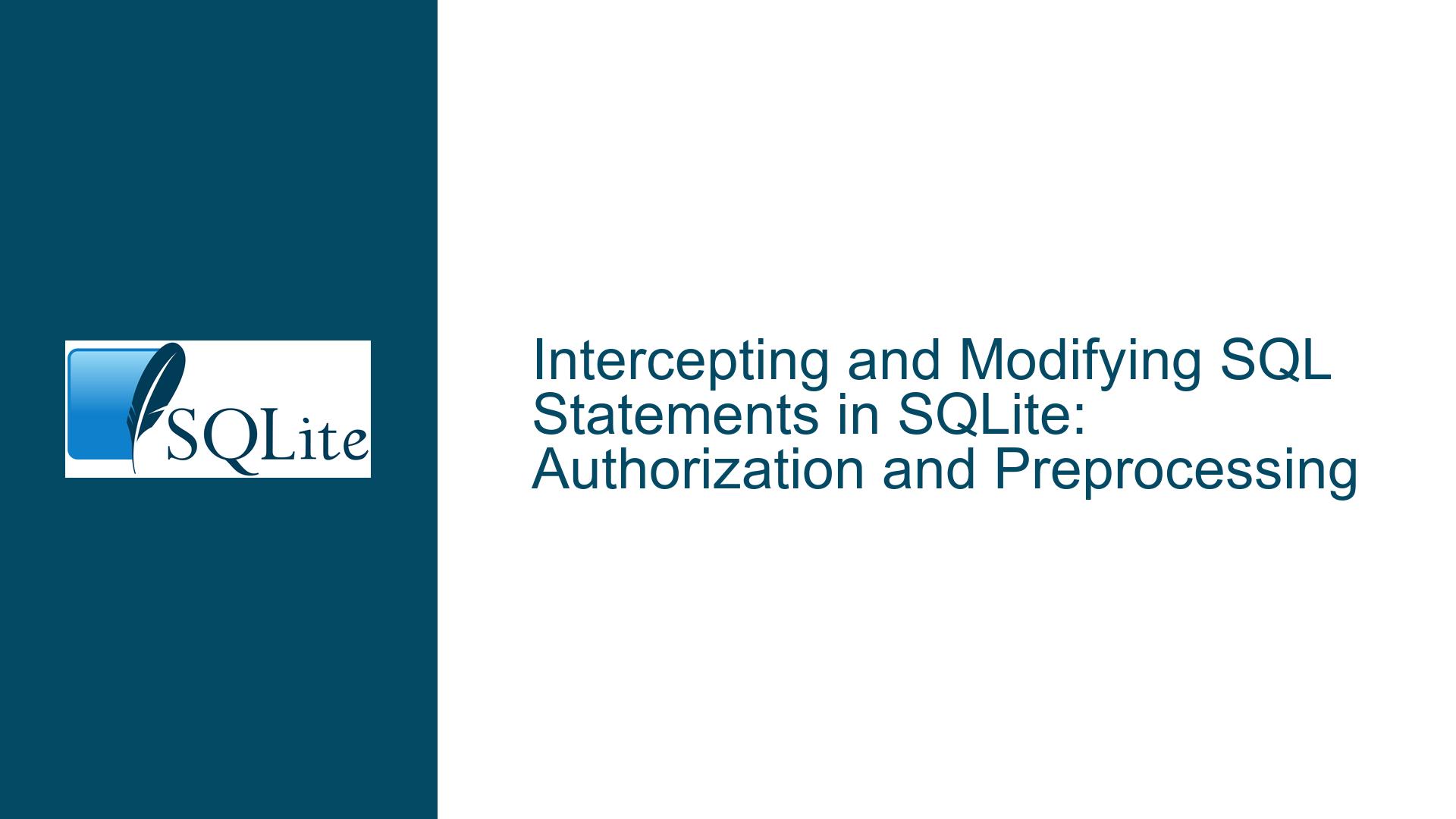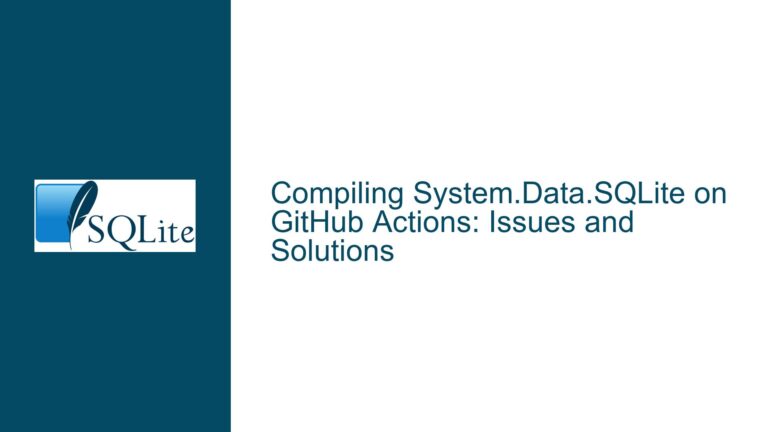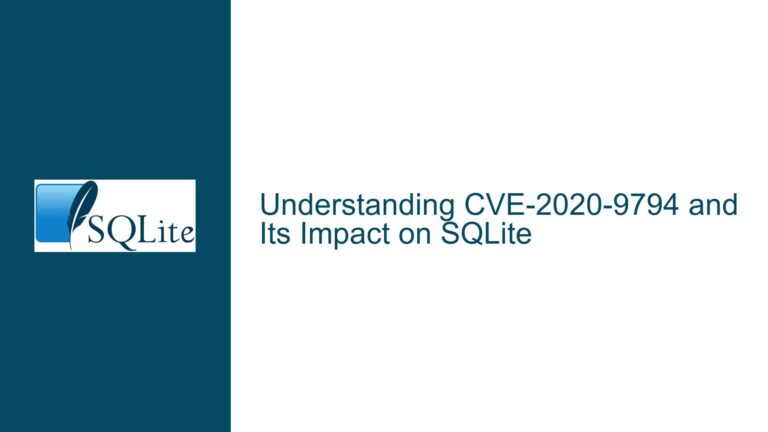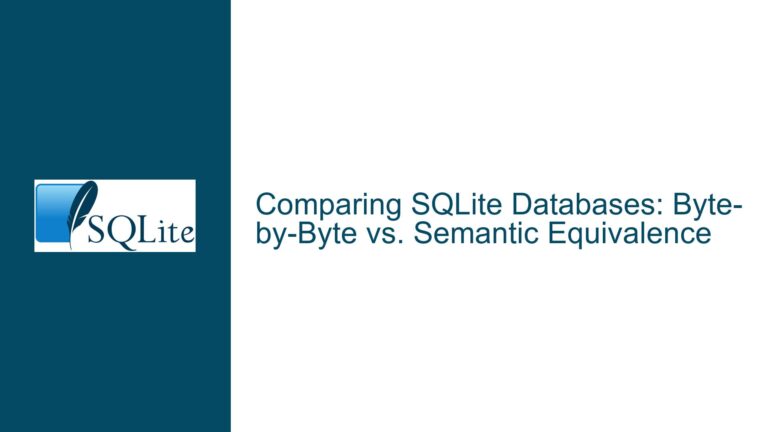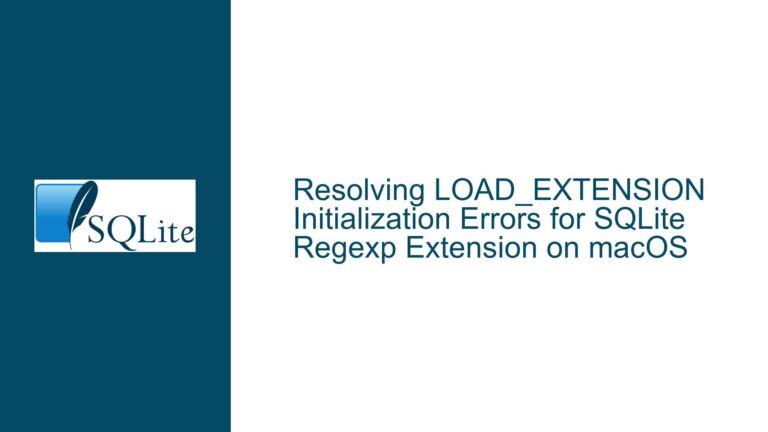Intercepting and Modifying SQL Statements in SQLite: Authorization and Preprocessing
Understanding the Core Requirements for SQL Statement Interception and Modification
The challenge of intercepting specific SQL statements before execution while optionally modifying their content involves two distinct but related technical requirements in SQLite-based applications. The first requirement centers around preventing certain classes of SQL operations from being executed based on developer-defined criteria. The second requirement focuses on dynamically altering the content of SQL statements before they reach the execution phase. These requirements commonly emerge in scenarios involving SDK development, security layers, or database operation auditing systems where granular control over database interactions is mandatory.
SQLite provides multiple extensibility mechanisms that enable developers to influence statement execution behavior. However, the absence of a direct "interceptor" API requires combining several features to achieve the desired functionality. The primary technical hurdle lies in distinguishing between SQLite’s preparation and execution phases while understanding how authorization callbacks operate at the statement parsing level rather than the textual SQL level. Developers must also confront the reality that SQL modification can only occur before statement preparation due to SQLite’s compilation of statements into bytecode during preparation.
Critical Analysis of Interception Mechanism Limitations and Authorization Workflows
Inadequate Use of Debugging Hooks for Execution Control
The initial approach using sqlite3_trace and sqlite3_update_hook fails because these facilities serve observational purposes rather than providing execution control. sqlite3_trace operates as a logging mechanism that receives SQL text after preparation but offers no avenue to cancel execution. Similarly, sqlite3_update_hook triggers after row changes occur, making it unsuitable for pre-execution interception. These tools lack abort semantics and execute in phases where the database engine has already committed to performing operations.
Authorization Callback Scope and Granularity
The sqlite3_set_authorizer function introduces a granular permission system that fires during statement preparation. Each database operation type (table reads, writes, schema changes) triggers authorization checks through user-defined callback functions. However, developers accustomed to string-based SQL analysis often struggle with the authorizer’s action code paradigm, which abstracts SQL syntax into numeric operation codes. For example, a simple SELECT * FROM users generates multiple SQLITE_READ actions for each column access rather than presenting the original statement text. This design requires authorization logic to operate at the database object access level rather than textual SQL pattern matching.
SQL Modification Timing Constraints
Once a statement reaches the sqlite3_prepare_v2 phase, SQLite compiles it into internal bytecode, making post-preparation modification impossible. Any SQL alteration must occur before preparation, requiring developers to intercept raw SQL strings at the application layer. This constraint becomes particularly complex when handling batched statements separated by semicolons, as naive string splitting fails to account for quoted semicolons within literals or complex SQL syntax structures.
Multi-Statement Execution Handling
Applications allowing multiple SQL statements in a single execution string (e.g., CREATE TABLE t(x); INSERT INTO t VALUES(1);) face additional complexity. The SQLite API processes these through sequential calls to sqlite3_prepare_v2 with pointer advancement, but intercepting individual statements requires precise management of the SQL input buffer. Failure to properly track statement boundaries leads to partial execution or authorization bypass scenarios.
Comprehensive Implementation Strategy for SQL Control and Modification
Implementing Granular Authorization with sqlite3_set_authorizer
Authorizer Callback Configuration
Register an authorization callback usingsqlite3_set_authorizer(db, auth_callback, user_data). The callback function signature follows:int auth_callback( void* user_data, int action_code, const char* param1, const char* param2, const char* db_name, const char* trigger_name );The
action_codeparameter determines the type of operation being authorized (e.g.,SQLITE_SELECT,SQLITE_INSERT). Subsequent parameters provide context-specific details like table and column names.Action Code Analysis and Policy Enforcement
Develop a policy engine that maps action codes to permission rules. For example, to prevent table creation:switch(action_code) { case SQLITE_CREATE_TABLE: return SQLITE_DENY; default: return SQLITE_OK; }Combine this with database name checks (
db_nameparameter) to implement cross-database policies. For column-level restrictions, useSQLITE_READandSQLITE_UPDATEactions with column name validation viaparam2.Transaction and Schema Change Control
Intercept transaction operations usingSQLITE_TRANSACTIONaction codes. To prevent schema modifications:if(action_code >= SQLITE_CREATE_INDEX && action_code <= SQLITE_CREATE_TRIGGER) { return SQLITE_DENY; }This range covers all schema-altering operations. For advanced scenarios, analyze the
param1value containing specific object names.Parameterized Statement Handling
Authorization occurs before parameter binding, so policies must account for unbound parameters. For example, a statement likeINSERT INTO t VALUES(:param)will triggerSQLITE_INSERTactions withparam2as the column name, which may beNULLfor anonymous parameters. Develop policies that either restrict parameterized statements or require complete column specification.
Pre-Execution SQL Modification Through Input Processing
SQL Input Interception Layer
Implement a shim layer that captures all SQL text before it reachessqlite3_prepare_v2. This layer performs string manipulation according to application rules. For example, rewritingDELETEoperations asUPDATE:char* modify_sql(const char* original) { if(strstr(original, "DELETE FROM") != NULL) { return convert_delete_to_update(original); // Custom logic } return strdup(original); }Ensure proper memory management for modified SQL strings to prevent leaks.
Multi-Statement Processing with Prepare/Split Workflow
Use iterativesqlite3_prepare_v2calls withpzTailpointer advancement to handle batched statements:const char* sql = input_buffer; const char* next_sql; while(sql && *sql) { sqlite3_stmt* stmt; rc = sqlite3_prepare_v2(db, sql, -1, &stmt, &next_sql); if(rc != SQLITE_OK) { /* handle error */ } // Analyze/modify SQL here using sqlite3_sql() const char* current_sql = sqlite3_sql(stmt); char* modified = process_sql(current_sql); // If modification needed, re-prepare if(modified) { sqlite3_finalize(stmt); rc = sqlite3_prepare_v2(db, modified, -1, &stmt, NULL); free(modified); } // Execute or block based on policy if(allow_execution(stmt)) { sqlite3_step(stmt); } sqlite3_finalize(stmt); sql = next_sql; }This approach safely splits multi-statement strings while allowing per-statement modification.
SQL Syntax Preservation During Modification
When altering SQL text, maintain syntax validity through:- Abstract syntax tree (AST) parsing for complex transformations
- Regular expressions with strict pattern matching boundaries
- Placeholder markers for parameter position invariance
For example, safely appendingLIMITclauses toSELECTstatements requires parsing the original query structure rather than simple string appends.
Whitelist-Based SQL Validation
Develop a statement whitelist using prepared statement templates:typedef struct { const char* pattern; // SQL with parameter placeholders int allowed_params; // Bitmask of allowed parameter indices } sql_template; int validate_sql(const char* sql, sql_template* whitelist) { for(int i=0; whitelist[i].pattern; i++) { if(sql_match_pattern(sql, whitelist[i].pattern)) { return check_parameters(sql, whitelist[i].allowed_params); } } return SQLITE_DENY; }This combines syntax pattern matching with parameter validation against a known-good set.
Hybrid Authorization and Preprocessing Architecture
Two-Phase Validation Pipeline
Combine SQL text analysis with authorizer policies for defense-in-depth:- Phase 1: Reject or modify SQL text at input layer using syntactic checks
- Phase 2: Enforce operational policies via authorizer during preparation
This ensures that even if modified SQL passes initial checks, the authorizer provides a final enforcement layer.
Contextual Policy Application
Maintain execution context in the authorizer’suser_dataparameter to implement stateful policies. For example, track the number of rows affected in a transaction and deny operations exceeding thresholds:typedef struct { int writes_remaining; } execution_context; int auth_callback(void* user_data, int action_code, ...) { execution_context* ctx = (execution_context*)user_data; if(action_code == SQLITE_INSERT) { if(ctx->writes_remaining-- <= 0) { return SQLITE_DENY; } } return SQLITE_OK; }Dynamic Policy Configuration
Implement hot-reloadable policy configurations using SQLite’s virtual tables or external configuration files. Map policy rules to authorizer action codes and SQL text patterns for adaptive security:typedef struct { int action_code; const char* object_pattern; int decision; } dynamic_policy; // During authorization: for(int i=0; i<policy_count; i++) { if(policy[i].action_code == action_code && fnmatch(policy[i].object_pattern, param1, FNM_NOESCAPE)) { return policy[i].decision; } }Error Handling and Diagnostic Instrumentation
Develop comprehensive error reporting that bridges both preprocessing and authorization phases:- Capture original and modified SQL versions
- Log authorizer denial reasons with action code translations
- Maintain statement execution timelines for audit purposes
Example instrumentation:
typedef struct { const char* original_sql; const char* final_sql; int64_t start_time; int auth_decision; } statement_audit_record; void log_audit_record(sqlite3* db, statement_audit_record* rec) { sqlite3_exec(db, "INSERT INTO audit_log VALUES(?,?,?,?)", /* bind rec fields */, NULL); }
Edge Case Handling and Performance Optimization
Balancing Security and Performance
- Precompile frequently used whitelisted statements to avoid repeated preparation
- Cache authorization decisions for parameterized statements with similar structure
- Use SQLITE_OMIT_AUTHORIZATION compile-time option in production after policy validation
Exception Handling for Complex SQL Constructs
- Handle savepoints and nested transactions through SQLITE_SAVEPOINT action code
- Manage attached databases via SQLITE_ATTACH and SQLITE_DETACH actions
- Intercept vacuum operations with SQLITE_VACUUM action code
Cross-Platform Consistency Considerations
- Account for SQLite version differences in action code support
- Handle collation sequence operations (SQLITE_FUNCTION action with COLLATION usage)
- Manage extension loading attempts via SQLITE_LOAD_EXTENSION action
Advanced Use Case: Statement Rewriting for Compatibility Layers
Implement SQL dialect conversion by modifying incoming statements to match SQLite’s syntax:char* convert_mysql_to_sqlite(const char* mysql_sql) { // Replace MySQL-specific constructs like BACKTICK identifiers char* converted = strdup(mysql_sql); regex_replace(&converted, "`", "\""); // Convert LIMIT/OFFSET syntax if needed return converted; }This enables the SDK to present compatibility with other SQL dialects while using SQLite as the backend.
Through meticulous integration of SQL preprocessing, authorizer policies, and statement lifecycle management, developers can achieve robust SQL statement interception and modification capabilities in SQLite. The key lies in understanding the separation between textual SQL handling and compiled statement operations, while leveraging SQLite’s extensibility points in their intended design paradigms.
